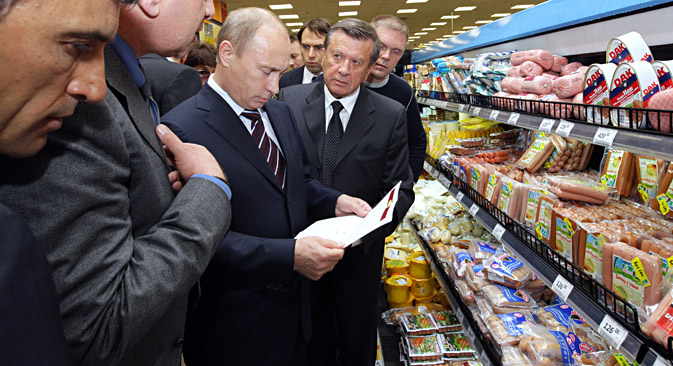
Vladimir Putin visiting a branch of the Perekrestok supermarket chain in Moscow, June 24, 2009. Source: Aleksey Nikolskyi / RIA Novosti
The Kommersant business daily reports that the Russian government is to look for and destroy banned food imports not only on its borders, as is happening now, but throughout the entire country, including in traditional stores and warehouses belonging to online food stores.
Meanwhile, Russian retailers say that there are no sanctioned products on the shelves or in the warehouses. Representative from the Metro Cash & Carry chain Oxana Tokareva explained that sales of banned European and American products continued for some time after the introduction of the embargo when goods that had entered Russia before the sanctions were still on the market.
However, Russian producers insist that European products, despite the ban, continue to enter Russia. According to the Federal Customs Service, in the first six months of 2015 552 tons of sanctioned goods were confiscated – about 10 percent of the overall volume of inspected products.
The centrist Nezavisimaya Gazeta newspaper reports that negotiations on the construction of the Turkish Stream pipeline have slowed down, but are nevertheless continuing. However, the four branches of the gas pipeline planned earlier may now become only one.
Both the Russian government and the Turkish ambassador in Russia denied announcements reported in the media last week that the Turkish Stream gas pipeline project, which is to supply gas from Russia to a distribution hub in Turkey via the Black Sea, is being postponed indefinitely.
Governments of both countries confirm that work is continuing, while official talks will be held in the future. It is expected that the Russian and Turkish presidents will discuss the fate of the pipeline by the end of November 2015. However, experts say that intergovernmental agreements on the realization of the project are unlikely to be signed before then, which means that 2015 can be considered a lost year for the construction of Turkish Stream.
Moreover, experts think that out of the four branches of the pipeline that were planned earlier, only one will remain: the one supplying gas to Turkey. In the words of partner at RusEnergy Consulting Group Mikhail Krutikhin, Moscow and Ankara may agree to the construction of this branch, but the other three, which were supposed to supply gas to European countries, replacing transit gas routes through Ukraine, are unlikely to be realized.
Kommersant also writes that Moldova's new prime minister Valery Strelets has announced the necessity of “resetting” relations with Russia. According to Strelets, an existing friendship and cooperation agreement between the two countries "does not work in practice."
"Russia is an important partner, but we do not have enough mutual understanding. Moscow treats us with jealousy, as if we were its possession. We must renew dialogue, explain our national interests. From the viewpoint of international law we are equals, even if we are different in the economic and military spheres," said Strelets.
He underlined that the governments must sit down at a negotiation table, discuss an entire range of issues and reset relations. Regarding the issue of the de facto independent Moldovan territory of Transnistria, where Russian peacekeepers have been deployed since the bloody Transnistria War in the early 1990s, the situation there has improved and a unification plan can thus be drawn up.
At the same time, experts interviewed by Kommersant believe that first and foremost it is the Chisinau government that is interested in an improvement of relations with Moscow. However, they do not believe the government has enough strength to realize the intention since its hands "are tied by a coalition agreement."
Experts say that all important decisions are made by the country's governing alliance council, whose influential members are promoting a rapid integration with the West, something that will contradict the prime minister's goals of normalizing relations with Moscow.
All rights reserved by Rossiyskaya Gazeta.
Subscribe
to our newsletter!
Get the week's best stories straight to your inbox